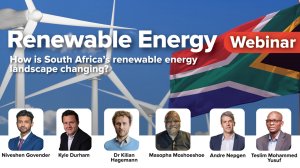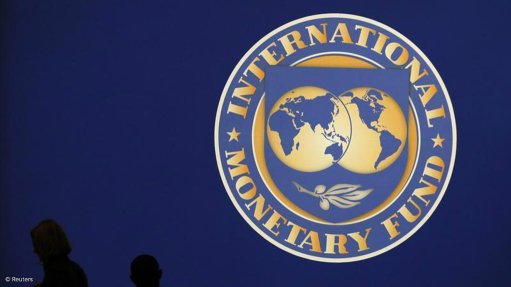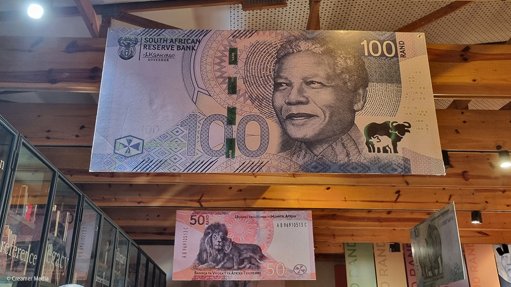Progress and barriers as South African energy market begins to shift

A panel of experts in a Creamer Media-hosted webinar unpacks how South Africa’s renewable energy landscape is changing.
South Africa's energy market is changing and becoming more diversified, but barriers and significant constraints also remain ahead on the journey to shape a reliable, inclusive, competitive and decarbonised power sector.
These sentiments were highlighted during the 'How is South Africa’s renewable energy landscape changing?' webinar hosted by Creamer Media on July 30.
The testing and tensions within the market were challenging and understandable, but they created opportunities for government departments to craft guidelines to clarify policies and regulations, said Department of Electricity and Energy renewable and green energy adviser Masopha Moshoeshoe.
The end-state objective remained to have a reliable, competitive and decarbonised power sector, he added.
Further, the recently launched South African Renewable Energy Masterplan had helped to frame the scale of what needed to be done in terms of renewable electricity to allow for industrial opportunities to support energy infrastructure development to be identified and seized, he said.
South Africa was only in the first stages of the liberalisation of its energy market, which had been dominated by a single provider for more than a century, said electricity demand aggregator and trading company Discovery Green head André Nepgen.
“What is particularly exciting is that the liberalisation of the market has enabled businesses to move from requiring a 20-year offtake contract at large-scale to access renewable energy at competitive costs to now being able to have a monthly contract,” he said.
Similarly, instead of a take-or-pay model, businesses could now pay for what they consumed. This changed the dynamic of businesses using renewable electricity and removed many of the risks associated with renewable energy, he said.
A foundational and critical mechanism to enable the transition to a diversified energy ecosystem was the establishment of the wholesale electricity market.
Bankability of renewable-energy projects was an enduring concern, but a wholesale energy market turned bankability on its head, as developers could conceivably build projects without the requirement to have massive guarantees or long-term commitments, Nepgen noted.
This mechanism would not only benefit traders, but also electricity distributors and all participants in the market, he added.
Further, the South African Wholesale Energy Market would also, beyond the addition of new generation capacity, lay the foundation for a range of auxiliary services, such as balancing, that would amount to new opportunities and innovations that would happen in this space, he pointed out.
“Some of the biggest innovations will come from lowering the requirements to access renewable energy. We will see more innovations as more banks, independent power producers (IPPs), electricity traders and investors become comfortable with taking the risks and offering new products and services to clients,” he said.
IPPs were best placed to enable a competitive wholesale electricity market that promised to drive down the cost of electricity in South Africa, as they had become used to strong competition and price competition from successive rounds of public procurement, said utility-scale hybrid renewable energy company G7 Renewable Energies CEO Dr Kilian Hagemann.
In an anti-competitive move, State-owned power utility Eskom had started litigation against the decision by the National Energy Regulator of South Africa to grant five electricity trading licences on the basis that it could not compete against private offtakers, he noted.
“However, there is nothing preventing Eskom from offering clean, cheaper electricity to customers like IPPs are doing. Eskom is only regulated on the maximum price it can ask; nothing prevents it from selling electricity at lower tariffs than the regulated maximum price.
“Eskom's current strongly antagonistic stance will constrain the delivery of many projects going forward,” he predicted.
Further, policy certainty was important to support the transition of South Africa's electricity market. For example, the noise around tariffs being imposed for private solar systems seemed to present the view that tariffs were being used to punish users of solar power, said financial services firm FNB Commercial head of sustainability Kyle Durham.
Overregulating the sign-off of solar plants was harmful to investment and curbed demand in an area of the market that was ready for investment. Rooftop solar single-handedly delivered about 6 GW of new generation within about 24 months, he said, referring to the period of rapid adoption in response to severe daily power cuts that peaked in 2023.
This scale of investment can be reignited quickly, if there is certainty and no overregulation, he emphasised.
However, there are differences emerging in the market compared with the 2023 boom in rooftop solar, which had seen a lot of capital being invested from businesses' and consumers' balance sheets.
“We can now see the cycle shift, with power purchase agreements at the commercial and industrial scale, and rent-to-own and solar-as-a-service in the residential market,” Durham pointed out.
Meanwhile, South Africa was not only experiencing an energy transition, but a transformation of its economy, said skills development authority Energy and Water Sector Education Training Authority planning, monitoring and evaluation executive Teslim Mohammed Yusuf.
When the list of requirements to establish a diversified energy market was analysed, it highlighted the need for diverse sets of skills, including artisans, engineers, scientists, financiers, technicians, technologists and regulators, among others, to design, finance, develop, operate and maintain the infrastructure, and to trade the electricity and to regulate the market, he pointed out.
It would be a mistake to think that the country is only transitioning its electricity sector, or to focus only on the energy sector, because the transition's impact cut across sectors, from manufacturing, to agriculture, to water and the financial sector, he said.
“We are transforming the structure of the economy, which will see the introduction of renewable energy for producing goods and providing services that will need to compete with global goods and services.
“Effective skills development initiatives need to be built into the fabric of the transition,” said Yusuf.
Article Enquiry
Email Article
Save Article
Feedback
To advertise email advertising@creamermedia.co.za or click here
Press Office
Announcements
What's On
Subscribe to improve your user experience...
Option 1 (equivalent of R125 a month):
Receive a weekly copy of Creamer Media's Engineering News & Mining Weekly magazine
(print copy for those in South Africa and e-magazine for those outside of South Africa)
Receive daily email newsletters
Access to full search results
Access archive of magazine back copies
Access to Projects in Progress
Access to ONE Research Report of your choice in PDF format
Option 2 (equivalent of R375 a month):
All benefits from Option 1
PLUS
Access to Creamer Media's Research Channel Africa for ALL Research Reports, in PDF format, on various industrial and mining sectors
including Electricity; Water; Energy Transition; Hydrogen; Roads, Rail and Ports; Coal; Gold; Platinum; Battery Metals; etc.
Already a subscriber?
Forgotten your password?
Receive weekly copy of Creamer Media's Engineering News & Mining Weekly magazine (print copy for those in South Africa and e-magazine for those outside of South Africa)
➕
Recieve daily email newsletters
➕
Access to full search results
➕
Access archive of magazine back copies
➕
Access to Projects in Progress
➕
Access to ONE Research Report of your choice in PDF format
RESEARCH CHANNEL AFRICA
R4500 (equivalent of R375 a month)
SUBSCRIBEAll benefits from Option 1
➕
Access to Creamer Media's Research Channel Africa for ALL Research Reports on various industrial and mining sectors, in PDF format, including on:
Electricity
➕
Water
➕
Energy Transition
➕
Hydrogen
➕
Roads, Rail and Ports
➕
Coal
➕
Gold
➕
Platinum
➕
Battery Metals
➕
etc.
Receive all benefits from Option 1 or Option 2 delivered to numerous people at your company
➕
Multiple User names and Passwords for simultaneous log-ins
➕
Intranet integration access to all in your organisation



















